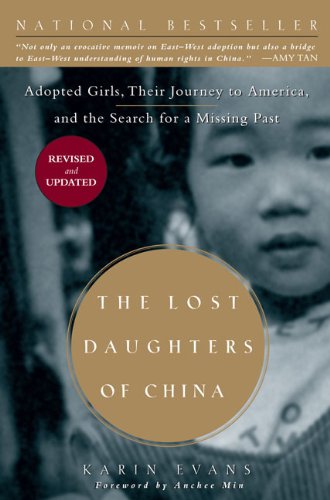A Fair Trade Book
Title: The Lost Daughters of China

Author: Karin Evans
Author's web page: https://www.linkedin.com/in/karin-evans-b0a8b57b
Date: 2000
Publisher: Penguin / Tarcher
ISBN: 1-58542-117-0
Length: 300 pages including endnotes and discussion guide
Quote: “Just about everybody I meet these days has a friend or a friend of a friend who has adopted, or is about to adopt, a little girl from China.”
Around the turn of the century, adopting Chinese children became trendy in my part of the world. All things Chinese also became trendy. My nephews have been taught Chinese versions of Sunday School songs. People who missed the fads for “aloha” and “ciao” are now greeting one another with “ni hao,” and there’s even a large display of all-Chinese merchandise sold by an Asian family in Gate City’s Friday Market.
And as those adorable infants entered school, books by and about Chinese-Americans popped up for sale everywhere. So I have a copy of The Lost Daughters of China.
For whom was this book written? Partly for the Chinese-American girls, who, as Karin Evans anticipated, might grow up wondering how they came to live in places where few people look like them. Partly for the relatives who might have wondered why they were being asked to accept all these little bundles of foreign DNA as their kin. Partly, the publisher seems to have hoped, for book clubs.
By now the book seems to raise more questions than it answers. Evans explains why we now have a cohort of nearly all female Chinese-American teenagers, many of whom have to choose between interracial dating and not dating at all, while back in China a corresponding cohort of boys may not even get the option of interracial dating. How bad is this situation from the teenagers’ point of view? Do they want to meet each other, and have efforts been organized to help them do so? If they do meet, will they be able to communicate with one another? In the absence of genealogical data for many of these girls, how will these teenagers know which of them can marry each other?
Anticipating these questions probably is to blame for the worst thing about The Lost Daughters of China: the prolactin haze that seems to steam up off the pages. Oh, how the adoptive parents love these children! How the natural parents who gave them up must have loved them! At times Evans’ emotionality made me draw back from the book, for air, and then I could almost see the writing between her lines: “Please, please don’t hate me for adopting you!”
The book that automatically suggests itself from comparison with The Lost Daughters of China is Jeanne Marie Laskas’ Growing Girls
What’s to love about The Lost Daughters of China? Lots of information—by now old, but well documented—with some effort to present both sides of an issue. The information can be read as a blistering indictment of a big totalitarian government, but Evans tries to be tactful and never misses a chance to commend a Chinese official for doing something right. The indictment is believable: whether you’ve ever dealt with a Chinese bureaucrat or not, you will recognize the way bureaucrats behave.
Evans also shares anecdotes that “Family Circus” fans will enjoy. One of Evans’ friends found that, when children aren’t buried waist-deep in playthings, they play at helping the grown-ups: her two-year-old adoptive daughter recognized dish towels in the laundry and immediately began folding them. More than one child who’d been told that she came from China seemed temporarily to believe that China is where all babies come from. “One three-year-old spent her first months in the United States looking at the group photographs of all the kids still at the orphanage and trying to ‘feed’ snacks to the children in the picture.”
There are also encouraging thoughts about the erosion of prejudice...all the more encouraging because so many of them come from San Francisco, where Chinese immigrant laborers used to be hated. “We can sometimes be too on edge. As I wheeled Kelly around a store...the saleswoman sighed and said, ‘These kids don’t know how lucky they are.’ I was just about to bristle, when she went on, ‘I’d love someone to push me around in a stroller all day.’”
Toward the end of the book, Evans quotes a journalist as predicting that trips back to China will be the next big trend. Sure enough, news reports now indicate that more foreigners are being allowed to tour China than ever before. Despite one ominous anecdote, it’s hard for a warmhearted and well-disposed American, like Evans, to resist the exotic richness suggested by the mere words “trip to China.”
Recent reports suggest that the historical, cultural, and biological wealth of China may be in as much danger as that of South America; Douglas Adams apparently really did have close to the Last Chance to See
This review was written about the first edition. You may notice that the photo shows that there's a revised and updated edition? That one should be more helpful to anyone considering an international adoption now. It reportedly includes anecdotes about what happened when some of these young women went back to China. I've not read it, and the first edition is still a nice piece of history...but since I've sold the copy I owned when I wrote this review and am now selling books from Amazon anyway, if you send $5 per copy + $5 per package (+ $1 per online payment) to either address at the bottom of the screen, you'll get the new edition. Unless, of course, you ask for the first edition. Either way, Evans or a charity of her choice will receive $1 per copy.
No comments:
Post a Comment